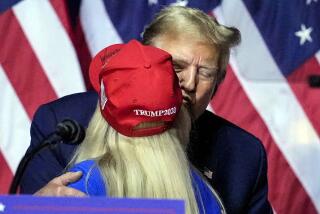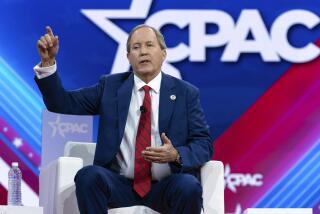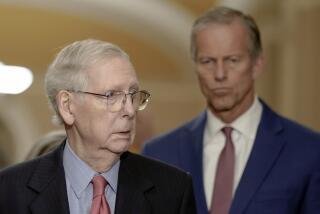Rick Perry has a history of acrimony with George W. Bush
Rick Perry was in Iowa three years ago, talking up a favored candidate, when the subject turned to George W. Bush, the president and a fellow Republican who preceded Perry as Texas governor.
Bush, or “George,” as Perry called him, was no fiscal conservative — “never was” — and his work on tort reform, a subject dear to Republican hearts, paled next to Perry’s achievements, the governor said.
“I mean, ‘95, ‘97, ‘99,” Perry went on, elaborately ticking the years off on his fingers, “George Bush was spending money!”
Those are fighting words among Republicans — especially Texas Republicans, who pride themselves on their stinginess — and even more so to Bush loyalists who, years later, still simmer over Perry’s off-the-cuff remarks. (How dare he slap the president like that, the Bush faithful fume, and refer to the leader of the free world as George!)
If Perry runs for president, his critics hope to tie him to Bush and those who delivered the self-assured Texan from Austin to the Oval Office.
“Is America ready for a president who was George W. Bush’s lieutenant governor, who was George W. Bush’s successor as governor ... and who, like George W. Bush, was also a Karl Rove puppet?” taunts Garry South, a Democratic consultant, referring to Bush’s strategist.
But that jibe ignores what has been, at best, a cool relationship between Bush and Perry, and a lingering hostility between their top political advisors.
The two share some characteristics, sometimes unnervingly so. They have similar accents, the same cowboy gait and many of the same mannerisms. But the two come from starkly different backgrounds, approach politics in utterly different fashions and even draw their support from different parts of the GOP. It is the difference, said a campaign consultant who has worked with both, between Yale and Texas A&M, between Phillips Academy Andover and Paint Creek High School.
To a certain upper crust of Republican, “Perry is the low-rent country cousin” who lacks Bush’s prep-school polish, said R.G. Ratcliffe, a longtime student of Texas politics who is writing a book about Perry. “They see him as a hick and are embarrassed having someone like that as governor.”
Privately, the former president has spoken of his successor as a political lightweight and someone not all that bright. Perry scoffs behind closed doors at Bush’s privileged background and popularity among country-club Republicans, suggesting the New England native is a faux Texan.
Perry’s story is the kind of up-by-his-bootstraps saga that Bush might have scripted for himself, had he been able.
He grew up in West Texas, in a farm town so small it literally was not on the state map until Perry, as governor, put it there. Life was austere; Perry was 6 before the family had indoor plumbing. His mother sewed his clothes, including the underwear Perry wore to college.
He graduated from Texas A&M with a degree in animal science, joined the Air Force, then returned to farming. On a whim he ran for state Legislature in 1984, as a Democrat, and won.
In 1990, under Rove’s tutelage, Perry switched parties and was elected agriculture commissioner. Eight years later, Perry ran for lieutenant governor. By then, Rove was working for Bush; the conflict between their political camps grew out of that year’s races.
Bush had been elected governor in 1994, and was already eyeing a run for president. Facing a weak opponent, he wanted to win reelection overwhelmingly and lift his numbers among blacks and Latinos to show crossover appeal. Perry faced the state’s popular Democratic controller, John Sharp, and had a much tougher time. The Bush and Perry teams squabbled over polling, voter targeting and the hard-edged tone of Perry’s campaign.
In the end, Bush won by 1.4 million votes. Perry scratched out victory by fewer than 70,000. Afterward, there were harsh words; today Rove and Dave Carney, a top Perry strategist, are bitter foes.
Perry took over as governor when Bush resigned to become president. (He did nothing to improve relations by hastening the Bush family’s exit from their living quarters.)
Both men hewed to the tenets of Texas Republicanism: low taxes, small government and limited regulation. But Bush prided himself on his ability to work with Democrats, while Perry took a much more partisan approach.
Bush also showed a greater willingness to spend on programs, especially education, with potential long-term benefits. Perry, by contrast, has cut billions from public education to help balance the state budget.
The governor has little use for the philosophy Bush dubbed “compassionate conservatism.” At a recent foray to the Republican Leadership Conference in New Orleans, he told a cheering crowd that conservatives should “stand up” and “stop apologizing” for their beliefs.
Perry has long been a favorite of Christian conservatives, embracing their issues with a zeal Bush lacked. He also has strong support in the “tea party” movement; Perry was at a local rally in 2009 when he broached the prospect of his state seceding from the union, a statement he later disavowed.
More recently, Perry used an emergency session of the Legislature to push for tighter restrictions on abortion and legislation to criminalize aggressive airport searches. The pat-down bill died Wednesday.
To supporters, Perry’s move demonstrated a fealty to fundamental principles, not least reining in what they consider the overly obtrusive federal government. To critics, including some in the Bush camp, it was another case of showmanship triumphing over substance.
For all of that, however, Carney said accounts of a Bush-Perry spat are overblown.
“They’re different people, bringing different experiences and philosophies to the process,” Carney said. “But they’re not at odds. That’s a silly, overblown urban myth that’s developed a life of its own.”
But last year’s gubernatorial contest was telling. Perry was bidding for an unprecedented third term. His opponent, in an unusual primary challenge, was U.S. Sen. Kay Bailey Hutchison. Rove served as a Hutchison advisor, along with other Bush loyalists. Bush’s father, former President George H.W. Bush, endorsed Hutchison. (George W. Bush stayed neutral.) Even so, Perry came from far behind and not only beat Hutchison, but did so overwhelmingly.
Carney insists there are no hard feelings. If Perry decides to run for president, he said, he will not focus on his Republican rivals or the governor he followed in office.
“[President] Obama is the person we’re trying to defeat,” Carney said. “That’s what Republicans are looking for. “
More to Read
Start your day right
Sign up for Essential California for news, features and recommendations from the L.A. Times and beyond in your inbox six days a week.
You may occasionally receive promotional content from the Los Angeles Times.







